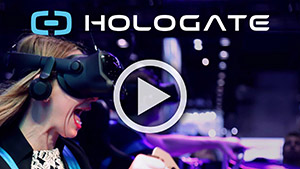CEO and president of ITEC Entertainment Bill Coan looks at how the theme park experience might evolve in a post-coronavirus world
Imagine arriving at Disneyland with your family and seeing branded hand sanitisers and Mickey Mouse face masks for sale. Throughout the park, there are hand-washing stations, temperature checkpoints, and ride operators wiping down roller coaster seats. This is what guests might expect from the post-coronavirus theme park experience: a huge emphasis on guest and employee safety and health. Theme parks have always prioritised these things, of course, but the extra measures will be hard to ignore when the destinations reopen.
With most of the industry on hold as many stay-at-home orders carry on into May, the amusement industry is planning on how to best prepare for re-openings during the summer or even the fall should shutdowns extend further into 2020. A recent J.P. Morgan analyst report estimated that the shuttering of all 12 Disney resorts around the globe amid the coronavirus pandemic could cost the division $5 billion in lost revenue this year. It cautioned that even a reopening as soon as June could cause a lingering impact through 2021.
Disney is just one example, as theme parks worldwide will need to implement strong reopening plans to make up for 2020 losses and bring guests back into the parks in droves. Considering theme parks could reopen before the pandemic has completely subsided, there are three main components of the process the themed entertainment industry should consider: strategic promotional campaigns, onsite health and safety measures, and limited-edition merchandise among longer term design enhancements and technological upgrades.
Post-Coronavirus promotional activities
As the world returns to more normal circumstances, the initial priority for theme parks will be to focus on making guests feel comfortable returning. A significant income stream of parks comes from family vacations planned months in advance. Large players in the space that provide integrated resort and theme park packages will offer discounts and specials to quickly secure these types of bookings. Smaller players that lack the same resources will likely seek to establish partnerships with local hotels and other tourist attractions to craft similar promotions, such as free friend passes and meal vouchers.
Additionally, the themed entertainment industry will initially focus on local and regional promotions since travel is likely to remain slow as stay-at-home orders are lifted. Parks may consider slashing annual pass prices to keep their regulars returning frequently. Seeing annual passholders enjoying theme parks through social media and other communication channels should help renormalise the experience, and entice others to return as well. On top of marketing package deals to consumers, theme parks will also highlight the extra precautions they are taking to keep family members safe and healthy.
Another strategy theme parks will consider will be hosting special days and events at the park centered on increasing the safety of seniors and their families, and guests with additional health concerns. Theme parks are about magic, fun, and making memories with family and friends, and no members must be left out of the experience.
Safety changes to the onsite guest experience
During the reopening period, theme parks must ensure their on-site health precautions meet or exceed the promise of their promotional campaigns. This could include branded safety merchandise, such as hand sanitiser and face masks, in addition to temporary social distancing policies after reopening. A helpful strategy for this includes capacity restrictions, particularly for show queue lines, to allow the public to feel a sense of personal space that is often not found in theme parks. Currently, many theme parks are partnering with health experts to administer best practice measures that will keep guests safe.
In addition to health measures, theme parks will implement themed entertainment technology during quarantine to assist in the deployment of new safety measures. For example, temperature checking technology will be incorporated into the security lines prior to entrance, providing both comfort to attendees still cautious from COVID-19 and as a preventative measure to curb the spread of the illness on-premises. Bob Chapek and the Disney team are currently renovating entrances and considering adding in temperature checks to their parks at this time. In pre-show areas and transport buses, the industry is considering implementing more counting tickers similar to metro buses in the US and abroad to make sure capacity is not surpassed.
Moreover, they may also incorporate technology into their retail and food facilities to limit the close interaction between staff and guests depending on how long the impact of the coronavirus lasts. Interactive food elements that were considered delightful pre-coronavirus, such as ice cream dipping by staff, could be replaced by machines that also hand the items to guests. Theme park visitors can also expect quicker line experiences with digital tickets and other integrated tech measures down the line – a measure they are always looking into but may see the need grow more rapidly in the coming months.
While theme parks traditionally hide bathrooms and other standard amenities to avoid disrupting the immersive guest experience, hand washing stations and sanitising stops will now be overtly promoted with signs throughout the park to promote health and safety. Additionally, guests will likely see roller coaster operators wiping down seats, and live characters using sanitiser after every photo opportunity with a guest.
Return visits and long-term design changes
Theme parks will initially leverage branded limited edition products to reinforce the safe and healthy nature of their theme parks post-coronavirus. Along with branded merchandise, marketing teams will also encourage guests to share their experiences online to spread their positive experiences at the park.
In addition to the short-term measures theme park developers are considering, they will also need to explore implementing longer-term changes for successful re-openings. Though a complete structural change to future parks is not economical, there will be some permanent internal design changes. Besides implementing more longer-term sanitising stations and seamless line experiences, typical theme park operations will likely return to normal when the residual shock of the pandemic subsides, similar to the ways humans have historically responded to outbreaks.
Although necessary safety and health precautions are a must, the theme park industry will move past this situation with lessons learned that will strengthen its future. Fans currently miss their parks so badly, they are creating roller coaster experiences in their living rooms for their kids, logging into virtual theme park gaming programs and preparing popular park food recipes to avoid feeling disconnected from their favorite destinations. The demand for theme parks is still there, and the supply will be back soon.
 Bill Coan is President and CEO of ITEC Entertainment. Bill’s primary responsibilities include business management and new business development. His vision and industry knowledge have helped cultivate ITEC Entertainment’s heritage as a global leader in themed entertainment. Bill also directs the creative development of concepts and designs of all ITEC themed entertainment projects and manages ITEC’s relationships with its clients and partners worldwide.
Bill Coan is President and CEO of ITEC Entertainment. Bill’s primary responsibilities include business management and new business development. His vision and industry knowledge have helped cultivate ITEC Entertainment’s heritage as a global leader in themed entertainment. Bill also directs the creative development of concepts and designs of all ITEC themed entertainment projects and manages ITEC’s relationships with its clients and partners worldwide.

